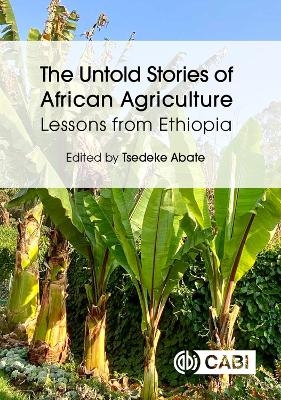
The Untold Stories of African Agriculture
CABI Publishing (Verlag)
978-1-80062-636-2 (ISBN)
This landmark volume presents the results of a comprehensive and coherent in-depth assessment of Ethiopian agriculture and draws lessons from it to generate actionable recommendations that will inform policy decisions and priority setting for agricultural transformation across Africa. Policy makers in Africa are faced with the challenges of ensuring food and nutrition security and the economic wellbeing of their rapidly growing populations while at the same time maintaining the integrity of their natural resource base. Between 2000 and 2021, 74% of the growth in overall crop production on the continent was derived from increases in land area expansion, while increases in yield contributed only 26% of the growth. This unchecked expansion of land use puts the sustainability of the natural resource base under severe pressure. Even though some countries have made substantial increases in their farm productivity over the last two decades, the overall performance for Africa is far behind other regions. For the most part, in Africa, agriculture is not fulfilling its expected functions of food and nutrition security, increased export earnings, import substitution, and raw material supply for local industries. Attempts have been made to transform African agriculture over the years, but few countries have succeeded in achieving sustainable change. Using examples from Ethiopia this book identifies the major factors for success and the root causes of underperformance, and offers evidence-based recommendations for future decision making, policy change and the creation of growth. This book: · Draws on a unique set of case studies from Ethiopia described and told from a truly African perspective. · Emphasises to policy makers in Africa that development cannot be outsourced and there are no shortcuts; it is only through consistent effort and sustained support for their agricultural research and development that positive change can be brought about. · States that past agricultural development efforts by the international community have not properly included a strong African voice, and that therefore, all future academic research, policies and strategies dealing with the continent's agriculture and food security should be formulated by Africa's own leading thinkers and experts. · Is not a polemic; its arguments are knowledge and evidence based, building a compelling picture of how agricultural development can be sustained for the future.
Tsedeke Abate has more than four decades of experience as a leader and researcher at international, regional, and national levels. He is the founder and leader of HGV (Homegrown Vision), an independent think-tank on African agriculture. He led the Drought Tolerant Maize for Africa project and CIMMYT's Maize Seed Systems in Africa between April 2012 and July 2017. Between February 2008 and March 2012, Tsedeke led the Tropical Legumes II project of ICRISAT which was implemented across Africa and Southern Asia. He was Director General of the Ethiopian Institute of Agricultural Research, where he introduced transformational changes, between December 2003 and March 2007.
Part I: Background Chapter One: Critical Issues in African Agriculture: A Synthesis Report Chapter Two: The Agricultural Resource Base Part II: Measuring Productivity Gains in Crops Chapter Three: Factors that Transformed Cereals Productivity Chapter Four: A Compelling Case for Increased Investment in Enset and other Root and Tuber Crops R&D Chapter Five: Increased Productivity and Socio-Economic Benefits of Grain Legumes Chapter Six: The Rise of Oilseeds in Export Diversification and Earnings Chapter Seven: The Rise and Decline of Vegetables in Export Diversification and Earnings Chapter Eight: The Place of Fruit Crops in Improved Nutrition and Trade Chapter Nine: Spices for Export Diversification Chapter Ten: Coffee and Other Plantation and Industrial Crops: Opportunities for Enhancing Productivity and Unlocking their Full Potential Chapter Eleven: Towards Realizing the Potential of Apiculture for Honey Production and Crop Pollination Part III: Role of Modern Science in Enhancing Agricultural Productivity Chapter Twelve: What Modern Science Can Offer to Accelerate Sustained Agricultural Productivity: The Role of Biotechnology Part IV: Crop Protection Chapter Thirteen: Protecting the Ethiopian Flora from the Ravages of Arthropod Pests Chapter Fourteen: Priorities for Plant Pathology Research and Development Chapter Fifteen: Economically Important Weeds and their Management Part V: Agricultural Inputs Chapter Sixteen: The Emerging Seed Systems Chapter Seventeen: Ethiopia Has Yet to Meet the AU Fertilizer Recommendation Chapter Eighteen: Agricultural Pesticide Use: Current Status and Critical Issues Chapter Nineteen: Status and Insights into the Future of Agricultural Mechanization Part VI: Climate Change and Irrigation Water Chapter Twenty: A Call for Increased Investment in Climate Change Chapter Twenty-One: Improved Water Use and Management for Enhanced Agricultural Productivity Part VII: Outreach Chapter Twenty-Two: Innovations in Agricultural Technology Transfer: Actors and Legacies Chapter Twenty-Three: Agri-Curriculum: The Foundational Role of Indigenous Knowledge in Early Childhood Education and Beyond Part VIII: Socio-Economic Benefits of Investment in AR&D Chapter Twenty-Four: The Changing Food Balance Sheet: What are the Policy Implications? Chapter Twenty-Five: Agricultural Commodity Trade: What are the Major Issues?
| Erscheinungsdatum | 22.08.2024 |
|---|---|
| Co-Autor | Melaku Admasu, Seid Ahmed Kemal, Getinet Alemaw, Dessie Ambaw |
| Verlagsort | Wallingford |
| Sprache | englisch |
| Maße | 172 x 244 mm |
| Themenwelt | Naturwissenschaften ► Biologie ► Ökologie / Naturschutz |
| Wirtschaft ► Volkswirtschaftslehre | |
| Weitere Fachgebiete ► Land- / Forstwirtschaft / Fischerei | |
| ISBN-10 | 1-80062-636-3 / 1800626363 |
| ISBN-13 | 978-1-80062-636-2 / 9781800626362 |
| Zustand | Neuware |
| Informationen gemäß Produktsicherheitsverordnung (GPSR) | |
| Haben Sie eine Frage zum Produkt? |
aus dem Bereich


